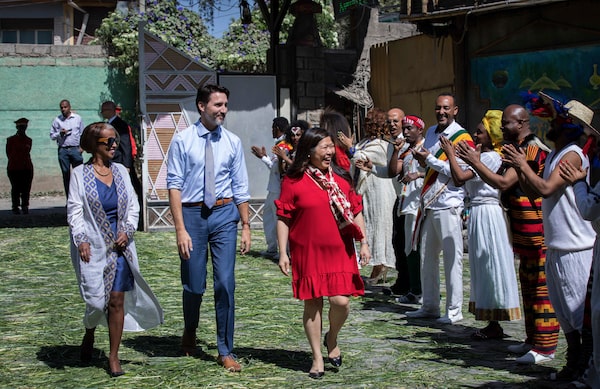
Our high quality of life is at risk if we fail to react to these economic changes. And Ethiopia is a good place to start. Let’s leverage this successful diplomatic visit by Canada's Prime Minister Justin Trudeau, seen here on Feb. 9, 2020, to open doors to collaboration, talent and technology for our entrepreneurs and innovators.Mulugeta Ayene/The Associated Press
Dan Herman is a tech entrepreneur and the force behind Their World, Our Future, a project that will tell stories about the entrepreneurs and innovators from emerging markets who are about to change their world and ours. Eric Bosco is the chief business development officer at Mitacs, a not-for-profit organization that fosters growth and innovation in Canada by solving business challenges with research solutions from the best academic institutions at home and around the world.
Prime Minister Justin Trudeau just wrapped up his visit to Ethiopia, but we need to go back – and soon.
We have a pressing need to ramp up our engagement with Ethiopia, and it has nothing to do with the success of the Prime Minister’s trip or the reason for it – garnering votes for a seat on the United Nations Security Council. We need to go back to tap into the exceptional entrepreneurs and innovators transforming that country’s economy to help secure the future of our own.
Ethiopia, Africa’s fastest-growing economy, with 110 million people, 70 per cent of whom are younger than 30, will be one of the world’s next emerging economies. Unfortunately, Canada isn’t there. We had only $170-million in trade with Ethiopia in 2018.
Canada’s entrepreneurs and innovators need to act now to get in on the ground floor of a rapidly growing economy, and that’s not limited to Ethiopia. Canada lacks entrepreneurial and innovation ties with Indonesia, the Philippines, Chile, Tunisia and a host of other countries that, thanks to advancements in educational attainment, infrastructure and burgeoning young demographics, will be home to the emerging economies of the next decade.
We’ve both had opportunities to visit entrepreneurial hubs in several of these countries recently, and we’re impressed by the quality of their infrastructure for innovation, as well as the ideas and solutions being developed. Be it with blockchain in Colombia or artificial intelligence in Tunisia, these countries are gradually becoming our competitors, let alone our partners, customers, suppliers and sources of talent.
Remember in the 1990s when the prime minister would set off for China with a plane loads of entrepreneurs, and the story of that emerging economy garnered headlines across the Western world? That’s the kind of mobilization Canada needs today toward the emerging economies of tomorrow, albeit not with the traditional trade-mission model.
Instead, we need a culture shift – government support for exporting has never been stronger. Yet our trade diversification statistics continue to fall far short, as does demand for the programs set up to help our businesses go abroad. The needed shift begins with building an understanding of our commonalities with these emerging markets. There’s a new generation of ambitious, educated and English-speaking entrepreneurs and innovators who want to build and sell to the same clients we do.
Take Tunisia, where, a decade after the Arab Spring rocked the country, a burgeoning high-tech community is bringing talent and solutions to global customers. Multilingual, highly educated and closely connected to several important regions, Tunisians are building North Africa’s hub for innovative young thinkers and doers. Canada needs to be there.
Many of our peer economies are already making these connections. So what’s holding us back?
Part of the problem is antiquated and negative perceptions of these places. Outdated views prevent us from seeing and getting to know the smart, ambitious, highly educated and innovative people behind these shifting economies.
Our entrepreneurs and innovators are quite comfortable connecting with the United States, France, Germany and Britain. And it’s important that they do. But as we lose market share in core traditional markets, which happens very gradually as other countries become more productive and competitive, we must connect with new people, new countries and new ideas.
Our high quality of life is at risk if we fail to react to these economic changes. And Ethiopia is a good place to start. Let’s leverage this successful diplomatic visit by Mr. Trudeau to open doors to collaboration, talent and technology for our entrepreneurs and innovators. We have to be where the growth is going to be, or like Wayne Gretzky taught us, “Skate to where the puck is going to be, not where it has been.”
We need to spark our collective curiosity about emerging markets and learn to appreciate that today’s green shoots of growth will be tomorrow’s forests of prosperity. Tapping into these markets is how we’ll drive economic growth and create jobs at home in the next decade. And that’s how we’ll maintain and enhance the quality of life we enjoy in Canada.